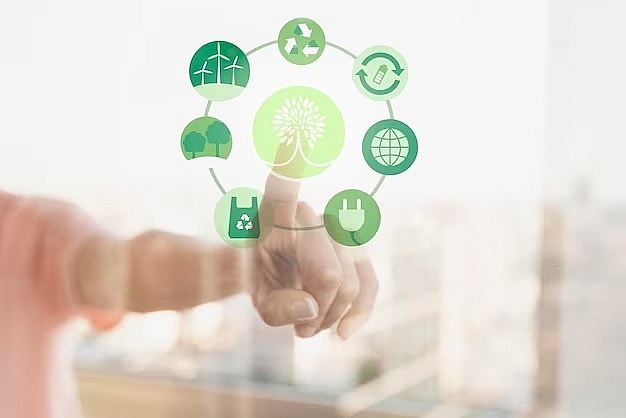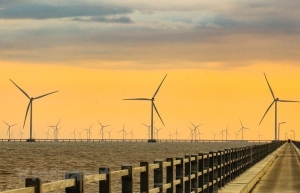Urgency a prerequisite for Vietnam’s green transition
 |
| Urgency a prerequisite for Vietnam’s green transition, illustration photo/ Source: freepik.com |
At last week’s Vietnam Sustainable Development Forum, Tran Trong Nguyen, president of the Academy of Policy and Development under the Ministry of Planning and Investment, said that the green transition can differ between localities, business sectors, and even individuals.
“The problem in the process of greening the economy is the inclusiveness of the transition, which ensures equality in conditions, opportunities to develop capacity, and enjoy the development outcomes, leaving no-one behind,” he said.
Specifically, the number of businesses and employees in the non-state and foreign-invested sectors increased rapidly, while the state-owned sector decreased clearly.
“To realise green growth goals, the foreign-invested businesses in Vietnam may achieve zero emissions commitments faster than local ones that are struggling with implementing green growth goals due to poor in experience, capital, and technology. Therefore, many businesses, especially small- and medium-sized enterprises, are left behind in the process of implementing sustainable development goals,” Nguyen added.
Other experts provided some contributions and suggestions for Vietnam in the green transformation and sustainable development. Andrew Goledzinowski, Australian Ambassador, said that the country should learn from Australia’s mistakes to put the right cash flow into green energy transition.
“Particularly, during the process, we have often discussed increasing people’s trust. Other countries are very interested in Vietnam’s green growth and sustainable development process. In fact, Vietnam is an attractive destination for investors with some unprecedented and interesting opportunities in green transition, so the most importance is how to carry out it successfully,” Goledzinnowski said.
Previously, through ANZ Bank, the Australian government supported Vietnam $90 million for the green transition process and announced to give more support for its sustainable development and call more private economy to do green transition.
Dorsati Madani, leading the Green Growth Agenda of the World Bank in Vietnam, said that the green process attracts many sources of investment capital like foreign investment. Meanwhile, the country is being affected seriously by climate change, with estimated losses at about $5 billion.
“Therefore, Vietnam should take many measures as soon as possible to cope with climate change, as well as mitigate carbon emissions,” she said. “The country has delivered numerous commitments on coping with climate change, but we should realise this soon. Particularly, it should have the ability to be self-reliant and resilient to the negative impacts of climate change, and stand firm against natural disasters.”
For sustainable development and developing cleaner industries, Madani suggested strengthening self-resilience capacity, such as educating people on sustainable development, training labour, promoting new economic activities, developing infrastructure resilient to climate change, and eliminating some energy sectors harmful to the environment.
“For a successful green transition, we should help workers and university students to update the necessary skills to work in the market, train them to use new technologies, and provide more knowledge,” Madani explained.
Currently, many countries have made significant progress in the process. For example, the US created 100,000 green jobs from August 2022 to January 2023, South Korea has mobilised $92 billion for a national government fund to implement carbon neutrality by 2028, and China has increased the total installed solar power capacity on-year by half in 2023.
Arnaud Ginolin, partner at Boston Consulting Group in Vietnam, said that any success in implementing green growth must sit alongside a strong legal system.
“Leading green countries have built clear policy frameworks to be a solid foundation for the green economy. In the US, the Inflation Reduction Act was enacted into law stipulating subsidies and loans for all green economic sectors, or the Good Neighbour Plan was enacted to control emissions,” Ginolin said.
Additionally, incentive mechanism, pilot programmes, administration and communications are also useful factors for the green transition process.
To realise Vietnam’s green growth targets, Ginolin offered some recommendations to accelerate a comprehensive process.
“We need a green classification system consistent with sustainable development goals, international standards, and the economic sector system,” he said. “Also under consideration should be a green incentive mechanism, supporting green pilot projects, promoting green finance, and carrying out multichannel communications.”
 | Green transition placing pressure on labour market Vietnam has a mountain to climb to create enough qualified workers for new roles in the country’s green energy transition. |
 | COP28 Vietnam Business Forum discusses green transition The Global Wind Energy Council (GWEC), Vietnam's Ministry of Planning and Investment (MPI), and the Embassy of Vietnam in the United Arab Emirates (UAE) co-organised The Vietnam Business Forum on December 2 to discuss mobilising resources for the country's green transition, gathering 160 key stakeholders to participate. |
What the stars mean:
★ Poor ★ ★ Promising ★★★ Good ★★★★ Very good ★★★★★ Exceptional
 Tag:
Tag:
Related Contents
Latest News
More News
- Trung Nam-Sideros River consortium wins bid for LNG venture (January 30, 2026 | 11:16)
- Vietnam moves towards market-based fuel management with E10 rollout (January 30, 2026 | 11:10)
- Envision Energy, REE Group partner on 128MW wind projects (January 30, 2026 | 10:58)
- Vingroup consults on carbon credits for electric vehicle charging network (January 28, 2026 | 11:04)
- Bac Ai Pumped Storage Hydropower Plant to enter peak construction phase (January 27, 2026 | 08:00)
- ASEAN could scale up sustainable aviation fuel by 2050 (January 24, 2026 | 10:19)
- 64,000 hectares of sea allocated for offshore wind surveys (January 22, 2026 | 20:23)
- EVN secures financing for Quang Trach II LNG power plant (January 17, 2026 | 15:55)
- PC1 teams up with DENZAI on regional wind projects (January 16, 2026 | 21:18)
- Innovation and ESG practices drive green transition in the digital era (January 16, 2026 | 16:51)






















 Mobile Version
Mobile Version